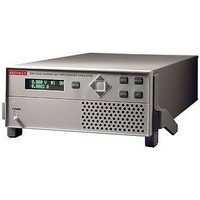2306 KEITHLEY, 2306 Datasheet

2306
Specifications of 2306
Available stocks
Related parts for 2306
2306 Summary of contents
Page 1
... Model 2306’s charger- simulator channel. Maximize Test Throughput with Accurate Battery Simulation The battery-output channels of the Models 2302 and 2306 are designed to simulate the output response of a battery. This capability, combined with their fast transient response, makes it possible to power the device during testing in exactly the same way as a battery will power the device during actual use ...
Page 2
... Battery/Charger Simulators Figure 2. Comparison of the voltage outputs of a lithium-ion battery (with an internal resistance of 260mW) and the Model 2306’s battery channel (programmed with an output resistance of 260mW) when powering a cellular telephone as it makes the transition from standby mode to transmit mode. In response to large load changes, the Model ...
Page 3
... Model 2302 and 2306 also offer DVM inputs. Both instruments allow measuring signals from –5V to +30V DC anywhere in the test system with the same rated accuracy as the voltage readback. The Model 2306 has two sets of DVM inputs; the Model 2302 has one. The DVMs and the power sources can operate simultaneously ...
Page 4
... Battery Simulator Battery/Charger Simulators ISOLATION (low–earth): 22V DC max. For Models 2306 and 2306-PJ, do not exceed 60V DC between any two terminals of either connector. PROGRAMMING: IEEE-488.2 (SCPI). USER-DEFINABLE POWER-UP STATES for Model 2306-PJ). REAR PANEL CONNECTORS: Two (one for Model 2302) 8-position quick disconnect termi- nal block for output (4), sense (2), and DVM (2). TEMPERATURE COEFFICIENT (outside 23° ...
Page 5
... NUMBER OF SAMPLES 5000. TRANSFER SAMPLES ACROSS IEEE BUS IN BINARY MODE: 4800 bytes/s, typical. LONG INTEGRATION MODE CURRENT MEASUREMENT 2302, 2306: Available on 5A range only. 2306-PJ: Available on 5A and 500mA current ranges. MEASUREMENT TIME 6 : 850ms (840ms seconds in 1ms steps. DIGITAL VOLTMETER INPUT (2 Years, 23°C ± 5°C) INPUT VOLTAGE RANGE: – ...
Page 6
... OUTPUT #2 (CHARGER) DC VOLTAGE OUTPUT (2 Years, 23°C ± 5°C) OUTPUT VOLTAGE +15V DC. OUTPUT ACCURACY: ±(0.05% + 10mV). PROGRAMMING RESOLUTION: 10mV. READBACK ACCURACY : ±(0.05% + 3mV). 1 READBACK RESOLUTION: 1mV. OUTPUT VOLTAGE SETTLING TIME: 5ms to within stated accuracy. LOAD REGULATION: 0.01% + 2mV. ...











